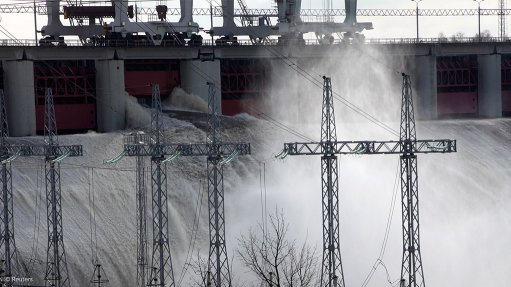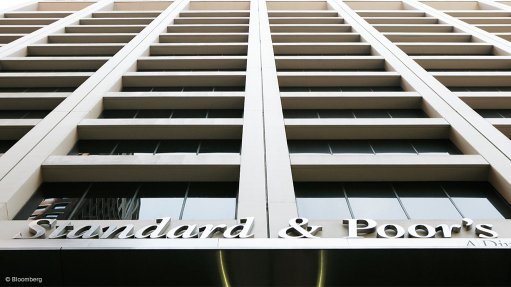Transnet not overly concerned by slump in export coal volumes

Transnet acting CEO Mohammed Mahomedy on the 6.5% fall in export coal volumes in 2018/19, which he describes as cyclical rather than structural. Camerawork and editing: Darlene Creamer 30.9.2019
State-owned logistics group Transnet reported a 6.5% fall, from 77-million tons to 72-million tons, in export coal volumes in 2018/19, but described the decline as cyclical rather than structural.
The group attributed the slump to “operational challenges, derailments, community unrest, train cancellations as well as general low demand in the first quarter”.
On December 20, a 200-wagon coal train derailed at Elubana, near Richards Bay, after saboteurs cut a portion of the line using a blowtorch. No injuries were reported, but 51 wagons derailed and Transnet Freight Rail issued a force majeure notice.
Acting CEO Mohammed Mahomedy said the performance of the coal line was sensitive to changes in commodity prices, which had been volatile during the 2018/19 financial year. He did not see the decline as structural in nature, however, reporting that Transnet was continuing to conclude take-or-pay contracts with coal exporters.
Mahomedy said that any new investments in the coal line or the associated Swazi Link, which would divert general cargo from the coal corridor, would be based on “validated demand”, including demand from other minerals, such as chrome and magnetite. Between 15- and 20-million tons of general freight is currently moved on the coal corridor yearly.
“A large bulk of our coal goes to India and I don’t know if that economy is ready to wean itself off coal right now,” he said, adding that Transnet was in talks with several potential coal exporters in South Africa and the region.
Mahomedy’s comments follow the release of a recent report published by the Institute for Energy Economics and Financial Analysis, which warns that South Africa’s thermal coal export industry is facing a “long-term, permanent decline” as new energy technologies replace coal-fired generation at a pace faster than was previously forecast.
The report also cautions that the risk to South Africa is further amplified by the fact that its exporters are more dependent on a single import destination, India, than is the case for other major thermal coal exporting nations.
In 2018, India was the destination for 48% of all South African thermal coal exports, leaving South Africa’s export industry highly exposed to just one nation, authors Simon Nicholas and Tim Buckley stated. In the first half of 2019, the figure rose to 60%.
“The last fiscal year saw the expansion of thermal power capacity in India slow to the lowest level in a decade as a major renewable-energy expansion continued. India’s Coal Ministry is now preparing a new plan to cut coal imports by one-third, or around 85-million tonnes, by 2024.”
Titled ‘South African Coal Exports Outlook: Approaching Long-Term Decline’, the report describes the global seaborne thermal coal market as being “oversupplied” and states that the outlook is for slowing demand in the longer term and heightened competition.
“The Richards Bay Coal Terminal may have to get used to the idea that an increasing proportion of its annual capacity will become stranded. With a capacity of 91-million tons per annum, Richards Bay operated with almost 20% spare capacity in 2018.”
Meanwhile, Transnet received yet another qualified audit for its 2018/19 financial year and also announced a dramatic rise in irregular expenditure to R49-billion, after locomotives contracts valued at R41.5-billion were added to the figure, which stood at R8-billion at the end of March 2018.
Mahomedy stressed, however, that all the locomotives contracts included in the irregular-expenditure amount had been concluded prior to 2015, while the vast majority of the additional irregular expenditure reported had not occurred during the year under review.
Transnet insisted, too, that significant progress had been made to establish adequate controls, particularly in the area of procurement.
The group also attributed its latest ‘adverse’ audit opinion not to the rise in irregular expenditure, but to the posture adopted by its external auditors, SizweNtsalubaGobodo, with regard to the tender prequalification criteria previously used by Transnet.
Acting CFO Mark Gregg-Macdonald said the tender prequalification issue, which, had been flagged late in the audit process, related to criteria used by Transnet, which, if deemed irregular, made the contract irregular and any spending under that contract irregular.
Transnet, which used the criteria to meet Competitive Supplier Development Programme requirements set by government, had since discontinued the practice. Nevertheless, the irregular expenditure associated with the criteria had been calculated to be R1.9-billion of the R49-billion.
SizweNtsalubaGobodo deemed the criteria to be inconsistent with South African legislation, a position that Transnet was disputing. Transnet had initially hoped that external mediation from the National Treasury, which was supportive of Transnet’s stance on the matter, would settle the matter.
However, with the stipulated six-month deadline for the release of results post-year-end approaching, Transnet, which had already delayed the release of its results twice, decided to publish the qualified results and continue with efforts to resolve the dispute in the coming months.
The results themselves were mixed, with volumes and capital expenditure (capex) falling, but revenue and net profit rising.
Capex fell to R17.9-billion, reducing investment by the group to below the R20-billion-level for the first time in several years and shifting the expenditure balance firmly towards replacement capital, rather than growth capital.
Mahomedy indicated that capex should recover to between R20-billion and R25-billion during 2019/20, but stressed that the figure would be “dynamic” and that Transnet would only invest on the basis of “validated demand”.
Revenue increased by 1.6% to R74.1-billion during the year, while profit for the year increased by 24.7% to R6-billion. Cash generated from operations increased by 0.7% to R35.2-billion.
Mahomedy said Transnet had secured all the funding it required to the end of March 2019, having raised R6.2-billion during the 2018/19 financial year, increasing its total borrowings to R127.7-billion.
“We expect that Transnet will continue to generate strong cash flows and maintain affordable debt levels without any government support,” he said.
Locomotive Settlements
Transnet also reported that settlement talks were under way with all four original-equipment manufacturers (OEMs) supplying it with 1 064 new diesel and electric locomotives under contracts that had since been deemed “irregular and unlawful” by the group.
Under a R49-billion procurement programme concluded in 2015, General Electric and China North Rail (CNR) were awarded contracts to supply 233 and 232 diesel locomotives respectively, while China South Rail (CSR) and Bombardier Transportation were contracted to supply 259 and 240 electricity locomotives respectively.
Mahomedy confirmed that General Electric had already completed delivery of its locomotives, while CSR had delivered 249 units, Bombardier Transportation 51 and CNR 21 to date.
He reiterated Transnet’s view that the contracts were unlawful and confirmed that “very confidential” discussions were under way with all OEMs, following some initial delays.
“We have had multiple discussions with the OEMs, as recently as last week and the next rounds of discussions [are scheduled for] later this week and early next week. We believe that, before the year is out, you should actually be hearing of the finalisation of some of the negotiations and discussions.”
Mahomedy would not be drawn on the nature of the settlements being sought, saying only that various matters were being considered, including delivery schedules, supplier development and the nature of the maintenance agreements.
Article Enquiry
Email Article
Save Article
Feedback
To advertise email advertising@creamermedia.co.za or click here
Comments
Press Office
Announcements
What's On
Subscribe to improve your user experience...
Option 1 (equivalent of R125 a month):
Receive a weekly copy of Creamer Media's Engineering News & Mining Weekly magazine
(print copy for those in South Africa and e-magazine for those outside of South Africa)
Receive daily email newsletters
Access to full search results
Access archive of magazine back copies
Access to Projects in Progress
Access to ONE Research Report of your choice in PDF format
Option 2 (equivalent of R375 a month):
All benefits from Option 1
PLUS
Access to Creamer Media's Research Channel Africa for ALL Research Reports, in PDF format, on various industrial and mining sectors
including Electricity; Water; Energy Transition; Hydrogen; Roads, Rail and Ports; Coal; Gold; Platinum; Battery Metals; etc.
Already a subscriber?
Forgotten your password?
Receive weekly copy of Creamer Media's Engineering News & Mining Weekly magazine (print copy for those in South Africa and e-magazine for those outside of South Africa)
➕
Recieve daily email newsletters
➕
Access to full search results
➕
Access archive of magazine back copies
➕
Access to Projects in Progress
➕
Access to ONE Research Report of your choice in PDF format
RESEARCH CHANNEL AFRICA
R4500 (equivalent of R375 a month)
SUBSCRIBEAll benefits from Option 1
➕
Access to Creamer Media's Research Channel Africa for ALL Research Reports on various industrial and mining sectors, in PDF format, including on:
Electricity
➕
Water
➕
Energy Transition
➕
Hydrogen
➕
Roads, Rail and Ports
➕
Coal
➕
Gold
➕
Platinum
➕
Battery Metals
➕
etc.
Receive all benefits from Option 1 or Option 2 delivered to numerous people at your company
➕
Multiple User names and Passwords for simultaneous log-ins
➕
Intranet integration access to all in your organisation



















